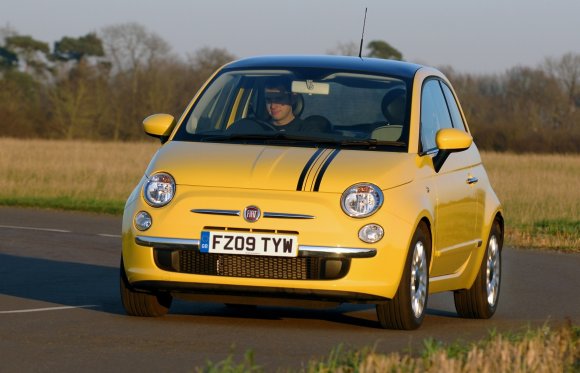
Last year, Jato Consulting found that Fiat lineup of cars was the lowest CO2-producing line in Europe. Fiat bosses must be smiling, because the same has been found for this model year. Fiat's cars produce an average of 137.3 g/km. This places Fiat ahead of all these guys
- Peugeot (138.1 g/km)
- Citroën (142.4 g/km)
- Renault (142.7 g/km)
- Toyota (144.9 g/km)
- Ford (147.8 g/km)
- Opel/Vauxhall (151.1 g/km)
- Volkswagen (158.8 g/km)
- BMW (160.6 g/km)
- Mercedes (185.0 g/km)
Fiat Group is also in the pole position for automotive groups (138.4 g/km), ahead of PSA, Renault, Toyota and Hyundai. Fiat's figure is also very close to the EU average of 130 g/km that becomes mandatory in 2015. Full press release after the jump.
[Source: Fiat]
PRESS RELEASE:
FIAT AUTOMOBILES IS EUROPEAN LEADER FOR CO2 EMISSIONS REDUCTION FOR THE SECOND YEAR RUNNING
Fiat Automobiles, one of Europe's 10 best-selling automotive brands, has for the second year running been confirmed as having the lowest average value for CO2 emissions from vehicles sold in 2008: 133.7 g/km (137.3 g/km in 2007). This impressive result has been corroborated by JATO, a world leader in automotive advisory and research services, founded in 1984 and now operating in over 40 countries.
The bottom line shows Fiat ahead of Peugeot (138.1 g/km), Citroën (142.4 g/km), Renault (142.7 g/km), Toyota (144.9 g/km), Ford (147.8 g/km), Opel/Vauxhall (151.1 g/km), Volkswagen (158.8 g/km), BMW (160.6 g/km) and Mercedes (185.0 g/km). Fiat Group is also in pole position for groups (138.4 g/km), ahead of PSA, Renault, Toyota and Hyundai.
Lorenzo Sistino, managing director of Fiat Automobiles, says: "The result of this important analysis rewards Fiat's ongoing quest for innovative solutions for the reduction of polluting emissions and levels of CO2. But Fiat's commitment has always been to the public's real needs and won't be stopping here.
"Our aim is to reinforce our European record in emissions reduction by introducing new engines, new technologies and new applications. New engines, like those with our innovative MultiAir system will gradually be installed in all our Group cars and will enable further reductions in consumption and emissions.
"New technologies, like Start&Stop, already introduced in the Fiat 500 and soon to be seen on all our latest models, will play their part, as will new applications like eco:Drive, an innovative software developed with Microsoft, that uses a USB port from the versatile Blue&Me system to achieve analysis of the driver's vehicle handling, thus helping to optimise behaviour in terms of consumption and emissions. Currently there are about 10,000 regular users who monitor their driving style in this way."
Worldwide, Fiat is one of the automotive companies offering the best response in the battle to beat the environmental impact of transport. To achieve this crucial objective, Fiat provides tangible solutions that are available to everyone now. Proof lies in the models available in today's market, in the investments made in new product development, and the schemes for research and sustainable mobility developed in partnership with public administrations.
Nor should it be overlooked that Fiat is Europe's leader in the production of compact vehicles, which are by definition the most eco-friendly. For instance, two years ahead of the competition, the Fiat 500 and Fiat Bravo have both been introduced with Euro 5 petrol and diesel engines. And by the end of 2009, most engines in the entire range will exceed stringent Euro 5 standards.
Fiat has also recently presented two important developments: its LPG range comprising Panda, Grande Punto and Bravo models, as well as ecological developments for the 500, Croma and Bravo. In particular, the latter includes selected versions at the forefront of the international scenario, with high technological content, low consumption and CO2 emissions. This is due to the application of specific systems like the innovative eco:Drive, the new Start&Stop – developed by Engineering & Design and FPT, with input from supplier partners like Bosch and Magneti Marelli – and special eco packs that include low rolling resistance tyres, low viscosity oils, aerodynamic packages and modified gearboxes.
Moreover, Fiat was the creator of MultiJet technology that drives all new generation diesel engines, as well as being the world leader of the OEM methane vehicle market. Fiat believes that methane engines are the most appropriate technological choice for dealing with pollution issues in urban areas. This is because the use of methane is a step in the right direction for environmental benefits (approximately a 23 per cent reduction in CO2 emissions and practically zero for PM emissions), but also in terms of cost efficiency. Fiat is a leader in this technology and the first manufacturer to offer an eco line – Natural Power – with an extensive range of dual-fuel vehicles using petrol and methane. These are able to meet the mobility demands of a large category of users, including the commercial vehicle sector.
Lastly, aside from its research into alternative fuels, Fiat has been downsizing diesel and petrol engines for some time, as can be seen with the new 1.4 T-Jet and 1.6 MultiJet families. In particular, the application of a state-of-the-art turbo compressor combined with reduced engine size means that performance comparable to or better than substantially larger engines can be achieved with significantly lower emissions and consumption.


Sign in to post
Please sign in to leave a comment.
Continue